December 23, 2022
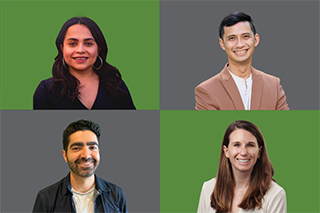
Four researchers affiliated with NIEHS Environmental Health Sciences (EHS) Core Centers have been selected to join the JPB Environmental Health Fellowship Program, administered by the T.H. Chan School of Public Health at Harvard University. The competitive program supports junior faculty from U.S. institutions who study how social and environmental factors influence health disparities in under-resourced communities.
The new fellowship class includes Max Aung, Ph.D., of the University of Southern California; Stephanie Eick, Ph.D., of Emory University; Jose Guillermo Cedeño Laurent, Sc.D., of Rutgers University; and Yoshira Ornelas Van Horne, Ph.D., of Columbia University.
Over the next 3.5 years, the fellows will benefit from funding, mentoring, and training opportunities. With the addition of the new cohort — comprising 14 fellows in all — the JPB Environmental Health Fellowship Program has recognized 41 researchers since its inception in 2014.
“Graduates from the program have gone on to take several leadership positions in academia and government and are changing the environmental health landscape,” noted Andrea Baccarelli, M.D., Ph.D., director of the EHS Core Center based at Columbia University.
“The JPB Environmental Health Fellowship is a really phenomenal program,” added Carmen Marsit, Ph.D., director of Emory University’s EHS Core Center. “Having seen the great success of the program, measured in tangible metrics, like publications and promotion of the fellows, as well as in intangible metrics, like the impact of the work on communities and on policy, I think this is an incredibly valuable experience."
Max Aung, Ph.D.
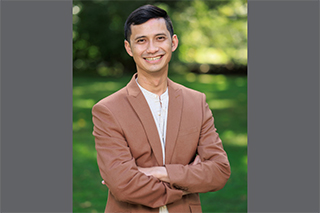
As an investigator with the University of Southern California (USC) Environmental Health Sciences Center, Max Aung, Ph.D., applies data science frameworks to study how environmental exposures affect human biological pathways across the course of life.
An assistant professor within the Keck School of Medicine at USC, Aung is also interested in expanding his research to understand how environmental and social influences shape neurobehavioral health, with a focus on immigrants. Ultimately, he wants his research to inform risk assessments, regulations, and interventions to reduce environmental exposures.
“It is critical to understand the joint influence of social and environmental factors on environmental health inequities to better tailor health-protective interventions that are grounded in social justice,” said Aung, who is a former fellow with Agents of Change in Environmental Justice, a program that tells the stories of diverse environmental justice leaders.
“I hope that through the JPB fellowship, I will learn new insights from my peers and the program directors to strengthen my approach for developing new research questions and proposals that address and inform solutions for widespread environmental contamination and health inequities,” he added.
“Max is a stellar scholar and already a leader in promoting career development for underrepresented minorities at USC and across the country,” said center director Rob McConnell, M.D. “His skills in research translation, and his dedication to science for environmental justice, for reducing health disparities, and for promoting diversity are exemplary. The JPB Fellows program is a sensational opportunity for him to further develop these skills. He is the future of environmental health.”
Stephanie Eick, Ph.D.
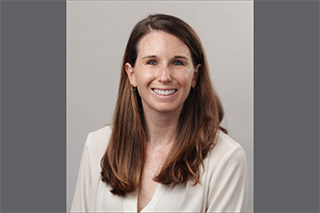
Reproductive and environmental epidemiologist Stephanie Eick, Ph.D., studies how psychosocial and socioeconomic stressors can amplify the harmful effects of chemicals during pregnancy.
“I have always felt that women are underrepresented in research, and as a woman it’s important to me to understand how ‘real world’ exposures can impact our health,” said Eick, who is an assistant professor in the Rollins School of Public Health at Emory University.
“I think that if we really want to intervene and prevent disease in a population, we need to start by understanding what happens in utero, as so many exposures during pregnancy can have lifelong implications,” she added.
Eick is a member of Emory’s HERCULES Exposome Research Center, where she is working on a pilot project to measure per- and polyfluoroalkyl substances (PFAS) in African American pregnant people living in Atlanta. As part of her data analysis, she will assess whether having a high level of unknown PFAS is associated with preterm birth — a health problem facing African Americans at disproportionately higher rates compared to other racial and ethnic groups, according to Eick.
“Dr. Eick utilizes novel analytical approaches to try and look collectively at social, physical, and chemical environments, epitomizing the concept of the exposome” — the measure of all exposures of an individual in a lifetime and how those exposures relate to health, said Marsit. “She tries to see everything through a health equity lens."
Jose Guillermo Cedeño Laurent, Sc.D.
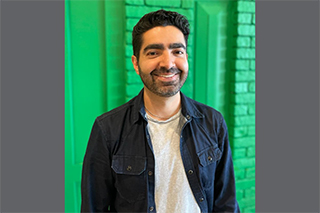
Rutgers University assistant professor Jose Guillermo “Memo” Cedeño Laurent, Sc.D., describes his work in environmental health as an evolving journey.
“My interest has grown from merely documenting the environmental exposures and their deleterious health effects to participating in creating solutions to root causes,” says Cedeño Laurent, who is a member of the Center for Environmental Exposures and Disease at Rutgers.
His research focuses on parsing the effects of climate change on human health, with the aim of developing equitable mitigation and adaptation strategies. A personal experience motivates him: His brother endured Hurricane Harvey, which in 2017 dumped copious rain on the Houston, Texas, area.
“The potential of a catastrophic scenario — similar to Hurricane Katrina — made me realize that we must lessen the impacts of such extreme weather events,” he said.
Through the JPB Environmental Health Fellowship, Cedeño Laurent hopes to gain expertise toward helping schools design strategies to improve indoor air quality and protect children from the effects of extreme temperature exposures. He also wants to prove that such measures enhance educational achievement.
“My work must put environmental justice first and foremost, finding creative ways to empower our communities to reduce their current and future environmental exposures,” he said.
“Dr. Laurent is uniquely qualified for the JPB Environmental Health Fellowship award,” said center director Helmut Zarbl, Ph.D., D.C.S. “His background in environmental health and engineering affords the ability to do groundbreaking and innovative research that is community-engaged and impactful. He is an outstanding colleague and collaborator.”
Yoshira Ornelas Van Horne, Ph.D.
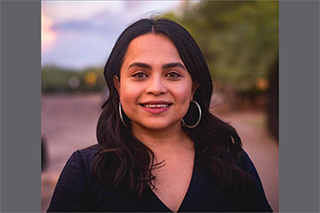
Exposure scientist Yoshira “Yoshi” Ornelas Van Horne, Ph.D., is an assistant professor and member of the EHS Core Center at Columbia University, where she focuses on the impact of environmental racism on human health and how community-driven approaches can improve well-being.
“I am motivated by being able to change power dynamics and structures, to fight for those who have never seen themselves as fitting in or belonging in academic spaces,” said Ornelas Van Horne, who is also assistant director of Agents of Change in Environmental Justice and a former recipient of an NIEHS Diversity Supplement.
Past research experiences have shaped Ornelas Van Horne’s trajectory. For example, as a doctoral student at the University of Arizona, she was involved in an NIEHS-funded project to understand exposure risks for Diné communities within the Navajo Nation following the 2015 Gold King Mine spill, which sent 3 million gallons of polluted water into the San Juan River.
“Working with the Navajo Nation demonstrated Dr. Ornelas Van Horne’s commitment to using science as a vehicle for community advocacy,” said Baccarelli. “Indeed, her novel research on the Diné’s reliance on river water for food, medicinal, and cultural purposes contributed to the first community-based risk assessment that is representative of the Diné way of life.”
“Through this fellowship, I am eager to focus on understanding how the health of communities has improved after receiving environmental reparations,” Ornelas Van Horne said. “I am also excited to be joining a cohort of researchers who are not only doing incredible science, but who are kind, action-oriented individuals.”


